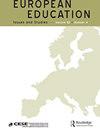技能形成制度的次国家差异:18个欧洲地区技能不匹配的比较分析
IF 0.9
Q4 EDUCATION & EDUCATIONAL RESEARCH
引用次数: 3
摘要
摘要本文采用技能生态系统的方法对不同技能形成机制下欧洲地区的技能不匹配进行了比较分析。技能形成制度的制度安排是在国家一级设计的。然而,它们是在劳动力市场和社会经济条件非常不同的地区制定的,这调解了制度设置与其对特定地区技能供需不匹配的影响之间的关系。我们的分析采用了欧盟“地平线2020”青年终身学习政策项目的定量和定性数据,该项目对9个欧洲国家的18个地区进行了比较。数据分析表明,区域需求侧因素在解释技能短缺和技能过剩,以及低技能和高技能均衡共存的城市地区,技能极化程度高。技能形成制度对技能不匹配的影响是不同的,这取决于该地区的就业机会和当地经济所需的技能水平。这些发现表明,在比较教育研究中结合技能形成机制和技能生态系统的方法可以更好地解释区域和部门层面的技能不匹配。本文章由计算机程序翻译,如有差异,请以英文原文为准。
Sub-National Variation of Skill Formation Regimes: A Comparative Analysis of Skill Mismatch Across 18 European Regions
Abstract This article adopts the skill ecosystem approach to the comparative analysis of skill mismatch across European regions within different skill formation regimes. Institutional arrangements of skill formation regimes are designed at national level. However, they are enacted in regions with very different Labor market and socioeconomic conditions, which mediate the relationship between the institutional setting and its effects on the mismatch between the supply and demand of skills in a given region. Our analysis draws on quantitative and qualitative data from an EU Horizon 2020 project on lifelong learning policies for young adults that compares 18 regions in nine European countries. The data analyses show the importance of regional demand side factors in explaining skill shortages and skill surplus, and the coexistence of low-skill and high-skill equilibria in urban regions with high levels of skill polarization. Skill formation regimes present divergent effects on skill mismatch depending on the availability of jobs in the region and the level of skills demanded by the local economy. These findings suggest that combining skill formation regime and skill ecosystem approaches in comparative education research can provide better suited explanations of skill mismatch at regional and sectoral level.
求助全文
通过发布文献求助,成功后即可免费获取论文全文。
去求助
来源期刊

European Education
EDUCATION & EDUCATIONAL RESEARCH-
CiteScore
1.20
自引率
0.00%
发文量
5
期刊介绍:
uropean Education is published in association with the Comparative Education Society in Europe (CESE). It is an international peer-reviewed journal devoted to original inquiries and dialogue on education across the member states of the Council of Europe. Established in 1969, the journal features articles on education in individual member states, comparative studies on education across Europe, as well as the impact of European education initiatives globally. The journal especially encourages theoretical and empirical studies, interdisciplinary perspectives, and critical examination of the impact of political, economic, and social forces on education. European Education includes reviews of books and educational films, including those published/produced in English and other languages.
 求助内容:
求助内容: 应助结果提醒方式:
应助结果提醒方式:


